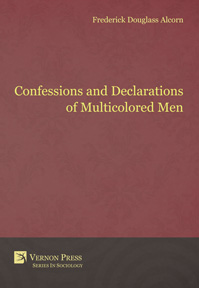Broken Branches
A philosophical introduction to the social reproductions of oppression from an intersectional feminist perspective
by Latashia Nicole Harris (University of Portland)
Purchase this book
(click here to change currency)
"“Broken Branches: A philosophical introduction to the social reproductions of oppression from an intersectional feminist perspective” by Latasha Nicole Harris explores identity and its relationship to power from an intersectionality theoretical perspective. The crux of the author’s argument appears to be grounded in the cross-disciplinary concept of marginalized socialization (social exclusion). This marginalization does not permit individuals and social groups to reach their full potential (self-actualization); thereby, placing them in the undesirable and untenable state of merely surviving when the true goal should be empowerment. The book devotes considerable attention to the root nature of reality and human experiences in an environment of unequal power relationships fostered over hundreds of years from generation to generation. Race and gender are aspects of identity that are explored deeply; however, other identifiers are covered as well.
Intersectionality theories purport to offer solutions for societal ills. Feminist and racial conflict theories, from myriad perspectives, define equality through the lens of gender and race. The author offers numerous historical examples, inclusive of documentation from subject-matter experts to support the author’s basic premise. Regardless of what one thinks about the tenets of intersectionality, racial conflict, and or feminist theories, the book contributes to the discussion of power relationships in a systematic and clear manner.
The author concludes that the socially marginalized cannot afford to be complicit in this marginalization anymore. While this is not a novel approach to analyzing and understanding power relationships, it is delivered with passion and detail. In the final analysis, the author argues that the socially marginalized must define themselves and write their own stories."
Elsie M. Barnes,
Norfolk State University
Broken Branches places a critical lens on the infrastructure, institutions, social processes and practices that govern our society. The text examines the ways that neoliberalism influences society and our lives across generations. The practice of colonialism is deconstructed, showing how this practice has been renamed, but holds steadfast to its original intention of cultivating institutionalized oppression that feeds social perception. The author exposes the ways that social perceptions, juxtaposed semantics, commonly accepted definitions, practices, rhetoric and propaganda create products of maintained systemic injustice when resistance is absent and desensitization is prevalent. Colonialism and its consequential social reproductions of oppression continue to traverse across land, body, and mind in individual as well as collective contexts. Broken Branches explores the tributaries of oppression but also highlights the source of oppression within the United States. The philosophical, intersectional and feminist approach of critical analysis lays the framework for further interrogation and utilizes the catalyst of historical precedence to initiate this introduction. The author implores the reader to take introspective steps towards understanding where one’s own complicity exists in oppression as well and addresses the cognitive dissonance we have become accustomed to in perpetuating oppression. Broken Branches offers suggestions on how to forge forward to create substantive and structural change that is not contingent on the dispossession and oppression of the marginalized so that the health and vitality of a few is sustained. Broken Branches encourages the practice of continuous inquiry and acknowledges that transformation is not possible without change. The author pushes for collectively empowered marginalized voices, operationalized pathways to inclusion, intersectional and equitable perspectives, and an increased investment in healing the trauma caused by the perpetuation of colonialism.
Acknowledgements
Introduction
Chapter 1 How We Got Here
Chapter 2 Whose Body Matters? Biopolitics & Criminalization
Chapter 3 What It Is and What It Ain’t: Public Space, Policy, and Practice
Chapter 4 The Institutions of Influence: Education and the Media
Chapter 5 Here We Go Again: Cyclical Oppression
Chapter 6 Trauma
Chapter 7 Epilogue: Creating Ourselves
Bibliography
Index
Latashia Nicole Harris was born and raised in Montgomery, Alabama and has lived in Alabama, Mississippi, Georgia, Virginia, Washington, D.C. and Portland, Oregon. Harris earned a B.S. in Interpersonal and Public Communications with a minor in Political Science from Mississippi College and a M.A. in Urban Affairs from Norfolk State University. Currently, Harris is pursuing an Ed.D in Educational Leadership and Learning at the University of Portland with a focus on critical pedagogy and inclusive design in formal and non-formal educational spaces. Harris has worked in Women and Gender Studies at George Mason University and is currently Racial Justice Program Director at the Western States Center, a nonprofit intermediary.
See also
Bibliographic Information
Book Title
Broken Branches
Book Subtitle
A philosophical introduction to the social reproductions of oppression from an intersectional feminist perspective
ISBN
978-1-62273-064-3
Edition
1st
Number of pages
192
Physical size
236mm x 160mm

![Broken Branches [Hardback]](/file/3886/063b8e316047b99a69f50e7d648688cd/1495318647.jpg)




